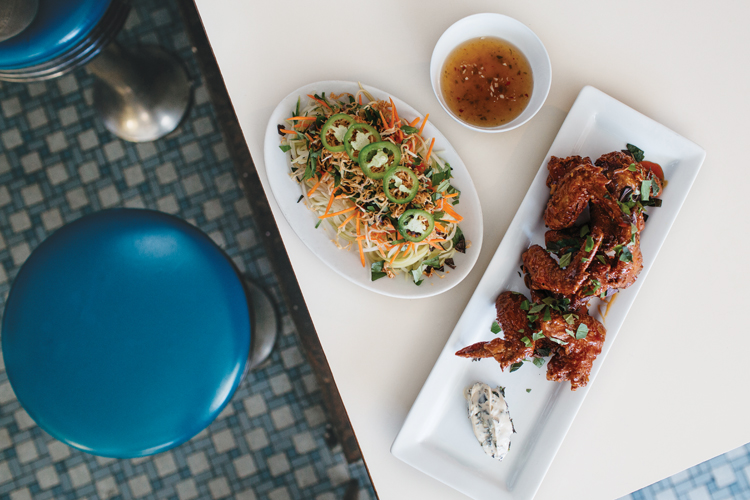
It’s a Friday afternoon in May, and the Vernor Coney Island is buzzing with activity in preparation for the crowds in town for the Movement electronic music festival. But the lunch counter is closed; not a single coney or breakfast plate will be served that weekend.
The crew, headed by chef George Azar, is busy chopping vegetables, unpacking fish sauce, and trying to stay cool behind the grill as they prepare dishes like the bò tái chanh (a Vietnamese version of the rare beef dish carpaccio), Korean-fried caramel chicken wings, or Azar’s pho.
But prep is not in a frenzied state. Azar coolly rolls tobacco for a smoke. Chef de cuisine Joe Flores is cracking jokes with a fellow crew member. Azar’s mentor is busy chatting with associates on the phone at a booth in the corner. The mentor’s son checks in to see how the gang is doing.
The scene feels more like a group of old friends preparing for a casual dinner party. Instead, they’re gearing up for the crowds who pack the coney island when it morphs into Flowers of Vietnam — a weekend supper club for Azar’s interpretation of Vietnamese fare. Since launching in January, it’s steadily been building buzz in southwest Detroit.
Azar, a rough-around-the-edges native of southwest Detroit, has worked in some of the most acclaimed kitchens in the country. The chef plans to expand the pop-up concept, thanks in part to his mentor, Paul Saginaw, the co-founder of the Zingerman’s empire and one of southeast Michigan’s most influential restaurateurs.
A shared desire to transform a community accustomed to hearty Midwestern fare brought the two together. In Saginaw’s case, the effort began more than 30 years ago when he wanted to bring a great corned beef sandwich to the once hippie enclave of Ann Arbor. As for Azar, who grew up within walking distance of Vernor Coney Island, his objective is about feeding the appetites of people in his own neighborhood who are starved for a creative dining experience, but who may not want to venture into the increasingly saturated city core.
Empowering a Community

Azar’s path to the business started at Schoolcraft College where he got a culinary arts degree. He worked in several establishments throughout metro Detroit, including at the Detroit Athletic Club and Forest Grill. Then, as many young chefs do, he decided to venture outside of the local bubble and explore the many food trends taking off elsewhere.
He left Detroit in 2010 and worked in several kitchens, including the acclaimed Alinea group in Chicago and Bouchon in Las Vegas. He was also a personal chef for a player on the NBA’s Charlotte Bobcats in North Carolina.
But shortly after Azar returned to Detroit in 2012, he was in a serious car accident, fracturing parts of his vertebrae and leaving him unable to move around to cook in a commercial kitchen. He was healing and studying hospitality at Michigan State University when, wearing a hefty back brace, he stepped into the then-new Astro Coffee in Corktown. That’s where he met Ben Saginaw, who had helped open the coffee shop.
The two immediately hit it off over coffee. Azar was impressed that Astro had helped to introduce Detroit to a “serious cafe.” The chef began to form a circle of friends with whom he could tap into his culinary creativity.
It took a while for Ben Saginaw to tell Azar about his father’s Zingerman’s connection; it just never came up until the chef asked Zachary Saginaw how he and his brother knew so much about food. When Paul Saginaw and Azar did meet, they instantly clicked. The two share many of the same viewpoints, namely that a restaurant can be a vehicle for empowering a community.
Paul Saginaw and his Zingerman’s partner Ari Weinzweig have deep ties to the Ann Arbor area. A family of 10 companies sprang from the Zingerman’s ethos of concentrating investment in one area, rather than spreading out thin nationally.
Saginaw “fell into restaurants,” he says. As a teenager he helped out in his friend’s father’s kitchen. He went off to college, traveled some, and considered a career in the chemistry field, but later returned to restaurants, first as a bartender at the Real Seafood Company. He eventually landed a job as a general manager at the now-shuttered Maude’s, where he met Weinzweig.
Weinzweig, a Chicago native, had just graduated with a degree in Russian history, and wanted to work as a server there. He didn’t get that job, but the two, both of Jewish ancestry, began planting the seeds to bring a high-quality deli to Ann Arbor.
“This is the late ’70s in Ann Arbor and it’s a wasteland (for) a lot of inventive food — certainly for any kind of ethnic food. And you couldn’t get anything that even approached a good corned beef sandwich,” Saginaw says. “On the weekend, I would drive into Detroit and I would buy a pound of corned beef and a loaf of rye bread and a Red Pelican yellow mustard. We’d have that food we grew up on and we thought that Ann Arbor could really use a good sandwich shop, and so we started collecting articles on food and we started developing an interest in really good food.”
Coming Home

For Azar, opening Flowers in his old neighborhood is personal. You can tell that he grew up here, a place that over the years has been troubled with street violence and poverty. It’s in the way he talks, that bit of an edge to his mannerisms.
While Azar doesn’t attest to having had many of the types of struggles as his peers around him, he says it was difficult living in Southwest Detroit nonetheless. “I wasn’t raised with a silver spoon, but at least I had a spoon,” he says. “Some of these guys around here didn’t even have a spoon.”
Still, home is home, and it’s apparent that Azar carries with him that sense of pride. He wanted to return and have an impact on his community, armed with knowledge from his travels. Azar had been exposed to a world of cuisine that he would never have tried back home, including Vietnamese food and cooking.

He began studying Vietnamese traditions, developing a pho recipe, and implementing his own unique techniques to traditional dishes.
The result, Flowers of Vietnam (the only business on the block, in a building owned by his dad) serves up cuisine that is a rare find in a neighborhood where the options are mainly Mexican fare or fast food — specialties like seasonal Vietnamese whole fried fish, broken rice with Chinese sausage and sugarcane shrimp, and egg-cream coffee.

“It … allows me to provide an experience to my community that they wouldn’t have access to, or think they would enjoy. Growing up (here) a lot of people never left southwest,” Azar says.
So far, Flowers has been treated much like a family affair: Azar holding it down in the kitchen, tending to every detail of the restaurant’s design plans, and the elder Saginaw using his decades of experience in the industry to guide along the way.
They’ve sought financial support from Motor City Match and the Downtown Development Fund to help pay for improvements to the coney space, as well as an additional storefront next door. Improvements include installing a patio out back, which will double the seating capacity.
The weekend supper club part of the business temporarily closed earlier this summer. Azar hopes to reopen later this year. And when Flowers returns, dinner will be expanded to five nights a week.
The Brooklyn- and Detroit-based architecture firm hired to handle renovations, Et al., is the same outfit that did the renovations for other local projects such as Selden Standard, Slows to Go, and Astro Coffee. Azar doesn’t want to change the old-school diner vibe of the place, but he does want to improve functionality, particularly in the kitchen.
As for the role that Azar wants Flowers to play in his hometown neighborhood, his viewpoint is very much in line with Saginaw’s vision back in the ’80s in Ann Arbor.
“I feel like southwest could end up being a destination in the city, much like downtown, Midtown, and Corktown.
“There has always been a thriving business community, but … I want to further that progression into my neighborhood,” Azar says.
|
|
|









